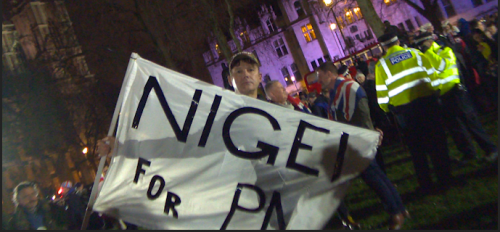
The mood was convivial and fairly relaxed as Rhubarb TV’s Station Manager Charlotte Hutton and I strolled on to Parliament Square on Friday evening. Union flags and St. George crosses flapped and furled in the icy January air and yet the revellers were seemingly insulated by the atmosphere of hope and relief.
This was the day that Brexiteers had been expecting for over 25 years and a cold January evening punctuated by fittingly British drizzle was not going to lower the mood. In one corner of Parliament Square the mood was particularly excitable. The ‘Liberty Bell’ was sounding a tune lacking both rhythm and timbre while flares were colouring the night sky in red and blue and men and women of all ages were hiding cheap cans of lager from the police. This wasn’t just a Brexit party; this was the Brexit party.
Those who had made their way to Parliament Square from all over the country were undoubtedly the most enthusiastic Brexiteers. They were united by a love of British ‘independence’ but that, and a love of dressing up and making oneself look a bit silly for a party, was where the unification seemed to end. The multi-faceted nature of the Brexit problem has never been more striking. Economics, trade, sovereignty and of course immigration were all mentioned as reasons for wishing to leave the European Union. Whatever the reason, it was always well thought through and derived from the application of logic. These people were shouting for independence; what independence looks like though is much more complex. It was as much about personal autonomy as it was national independence.
“We were in the minority, but look at us now!” an excited voice shouted. “This man’s making me feel threatened … if we do that to you, we get nicked!” an angry, frustrated man complained to police and Remain counter-protesters on Whitehall. This was a group of people whose views have resided on the fringes of British politics and yet on Friday evening in a verbal orgiastic melée of opinions they started to emerge from the shadows. The anger and discontent felt by some hung in the air. These people had felt marginalised by a culture of political correctness and an ever more progressive society in which we now live. They’d had enough.
The debate on the efficacy of political correctness is one that is controversial. Whilst personally agreeing with the basic concept of common decency and respect it is not an argument I shall be entertaining. Instead, what became clear is that by telling people outright their genuinely held opinions were wrong or even dangerous, society creates an environment in which people feel marginalised. It gives them something to fight for. Their opinions become even more extreme and their resolve is only strengthened as they believe they are fighting oppression.
It became obvious, if you tell enough people they are wrong enough times, they will hit a breaking point. The Remain campaign telling Brexiteers they were uneducated, wrong and dangerous is as much to blame for Brexit as the Leave campaign. Friday night was the breaking point. The people in Parliament Square felt they had earnt their party; to some extent they had. Whether they’ll be partying in 10 years’ time remains to be seen.
